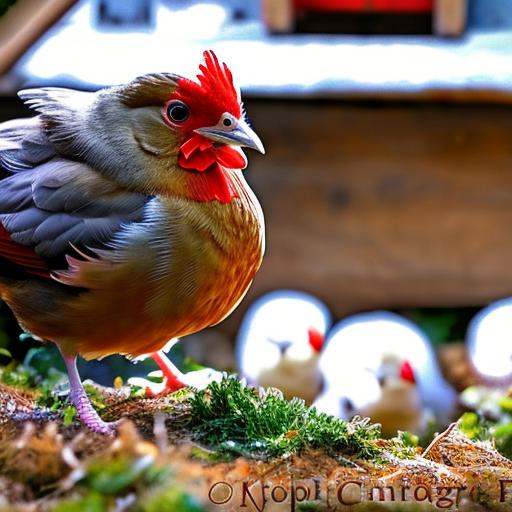Backyard chicken keeping has become increasingly popular in recent years, as more people are recognizing the benefits of raising their own chickens for eggs and companionship. However, it is important to remember that chickens, like any other living creatures, require a comfortable and safe living space in order to thrive. In this article, we will explore the importance of providing a cozy coop for your chickens and discuss various aspects of creating the perfect home for your feathered friends.
Key Takeaways
- Cozy coops are important for the health and well-being of your chickens.
- Choosing the right location for your coop is crucial for your chickens’ safety and comfort.
- Insulating your coop can help regulate temperature and prevent moisture buildup.
- Proper ventilation is necessary to balance fresh air and warmth in your coop.
- Artificial lighting can benefit your chickens’ egg production and overall health.
Understanding the Importance of Cozy Coops for Your Chickens
A cozy coop is essential for the well-being of your chickens. It provides them with protection from the elements, a sense of security, and can even improve egg production. Chickens are sensitive to extreme temperatures, so a well-insulated coop can help keep them warm in the winter and cool in the summer. Additionally, a cozy coop provides a safe space for your chickens to roost and lay their eggs, reducing stress and promoting healthy egg production.
Choosing the Right Location for Your Coop
When choosing a location for your coop, there are several factors to consider. First and foremost, you want to ensure that your coop receives an adequate amount of sunlight and shade throughout the day. Chickens need sunlight to produce vitamin D, which is essential for their overall health. Additionally, you want to choose a location that is easily accessible for cleaning and maintenance. Consider placing your coop close to your home so that you can easily monitor your chickens and provide them with care when needed.
Insulating Your Coop: A Step-by-Step Guide
| Step | Metric |
|---|---|
| Step 1 | Measure the coop’s dimensions |
| Step 2 | Choose the insulation material |
| Step 3 | Calculate the amount of insulation needed |
| Step 4 | Prepare the coop for insulation |
| Step 5 | Install the insulation material |
| Step 6 | Seal any gaps or cracks |
| Step 7 | Monitor the coop’s temperature |
Insulating your coop is crucial for maintaining a comfortable temperature inside. This is especially important during the winter months when temperatures can drop significantly. To insulate your coop, you will need materials such as insulation boards, caulk, and weatherstripping. Start by insulating the walls and ceiling of your coop, making sure to seal any gaps or cracks. Next, insulate the floor to prevent drafts from coming up through the ground. Finally, install windows and vents to provide proper ventilation while still maintaining insulation.
Ventilation: Balancing Fresh Air and Warmth
Proper ventilation is essential for the health and well-being of your chickens. It helps remove moisture, ammonia, and other harmful gases from the coop, while also providing fresh air. However, it is important to strike a balance between fresh air and warmth, especially during the winter months. To achieve this, strategically place windows and vents in your coop to allow for airflow without creating drafts. It is also important to regularly clean and maintain your coop to prevent the buildup of ammonia and other harmful substances.
Lighting Your Coop: The Benefits of Artificial Light

Providing artificial light in your coop can have several benefits, especially during the winter months when daylight hours are shorter. Artificial light can help extend egg production by stimulating your chickens’ reproductive systems. However, it is important to provide a consistent lighting schedule and not overdo it. Aim for 14-16 hours of light per day, and make sure to provide a period of darkness for your chickens to rest.
Choosing the Right Bedding Material
Choosing the right bedding material for your coop is important for the comfort and health of your chickens. There are several options to choose from, including straw, wood shavings, or sand. Each material has its own advantages and disadvantages, so it is important to consider factors such as absorbency, odor control, and ease of cleaning. Regardless of the material you choose, make sure to regularly clean and replace the bedding to maintain a clean and healthy environment for your chickens.
Providing Adequate Food and Water
Providing your chickens with a balanced diet and clean water is essential for their health and well-being. Chickens require a diet that is high in protein, vitamins, and minerals to support egg production and overall health. Make sure to provide a commercial chicken feed that is appropriate for their age and breed, as well as fresh fruits and vegetables as treats. Additionally, make sure to regularly clean and refill their water containers to ensure they have access to clean and fresh water at all times.
Protecting Your Coop from Predators
Protecting your coop from predators is crucial for the safety of your chickens. Predators such as raccoons, foxes, and even neighborhood dogs can pose a threat to your chickens. To protect your coop, install fencing around the perimeter to prevent predators from gaining access. Additionally, consider using motion-activated lights or alarms to deter predators. It is also important to keep your coop clean and free of food scraps, as these can attract predators.
Keeping Your Chickens Active and Entertained
Keeping your chickens active and entertained is important for their mental and physical well-being. Chickens are naturally curious creatures and enjoy exploring their surroundings. Provide them with plenty of space to roam and forage for insects and plants. You can also provide them with enrichment activities such as hanging treats or providing a dust bath. Additionally, consider adding perches or platforms inside the coop for them to roost on.
Monitoring Your Chickens’ Health and Well-Being
Monitoring your chickens’ health and well-being is essential for catching any potential issues early on. Regularly check your chickens for signs of illness, such as lethargy, loss of appetite, or abnormal droppings. Provide regular veterinary care, including vaccinations and deworming, to prevent common diseases. Additionally, observe their behavior on a daily basis to ensure they are active, alert, and interacting with each other.
In conclusion, providing a cozy and safe living space for your chickens is essential for their health and well-being. A cozy coop offers protection from the elements, a sense of security, and can even improve egg production. By choosing the right location, insulating your coop, providing proper ventilation, and taking other necessary steps, you can create the perfect home for your feathered friends. Remember to regularly monitor their health and well-being, provide them with a balanced diet and clean water, and protect them from predators. With proper care and attention, your chickens will be happy and healthy for years to come.
If you’re looking for ways to keep your chickens warm at night, you may want to consider insulating your chicken coop. Insulation can help regulate the temperature inside the coop and provide a cozy environment for your feathered friends. Check out this article on how to insulate a chicken coop for some helpful tips and ideas. By properly insulating your coop, you can ensure that your chickens stay comfortable and protected from the cold during those chilly nights.
FAQs
What temperature is too cold for chickens at night?
Chickens can handle temperatures as low as 20°F, but they need to be protected from wind and moisture.
What are some ways to keep chickens warm at night?
Some ways to keep chickens warm at night include providing a well-insulated coop, using a heat lamp or ceramic heater, and adding extra bedding.
Is it safe to use a heat lamp in a chicken coop?
Yes, it is safe to use a heat lamp in a chicken coop as long as it is properly secured and the chickens cannot come into contact with it. It is important to use a heat lamp specifically designed for use with animals and to follow all safety instructions.
How much bedding should be used in a chicken coop?
Aim for at least 6 inches of bedding in the coop to provide insulation and warmth for the chickens. The bedding should be changed regularly to keep it clean and dry.
What should I do if my chickens are still cold at night?
If your chickens are still cold at night, consider adding more insulation to the coop, using a higher wattage heat lamp, or adding a heated waterer to provide additional warmth. It is important to monitor the temperature in the coop regularly to ensure the chickens are comfortable.
Meet Walter, the feathered-friend fanatic of Florida! Nestled in the sunshine state, Walter struts through life with his feathered companions, clucking his way to happiness. With a coop that’s fancier than a five-star hotel, he’s the Don Juan of the chicken world. When he’s not teaching his hens to do the cha-cha, you’ll find him in a heated debate with his prized rooster, Sir Clucks-a-Lot. Walter’s poultry passion is no yolk; he’s the sunny-side-up guy you never knew you needed in your flock of friends!







